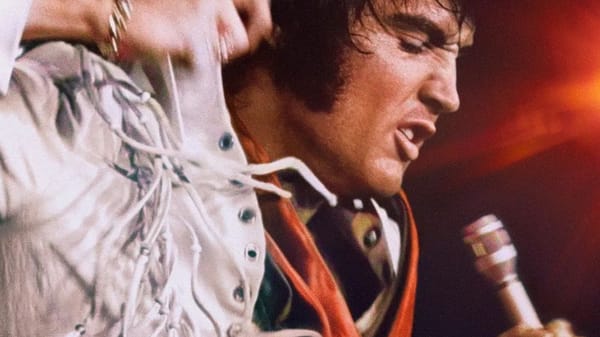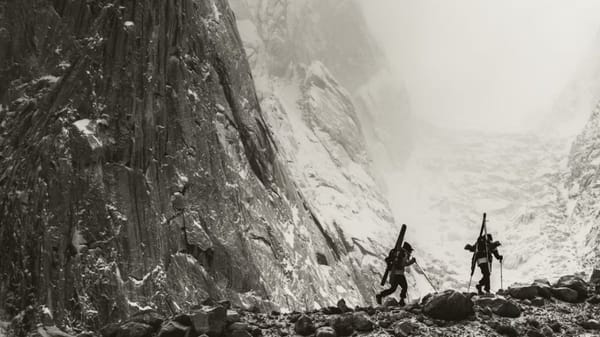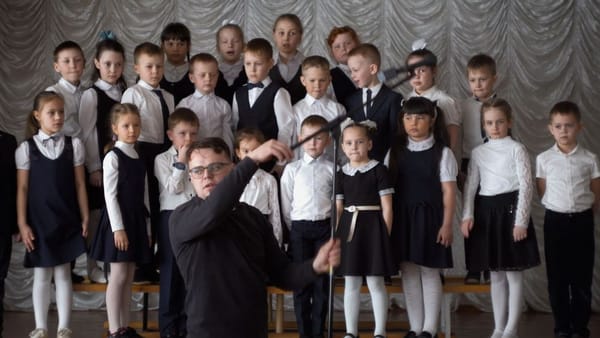Doc Rewind: Heaven (Diane Keaton, 1987)
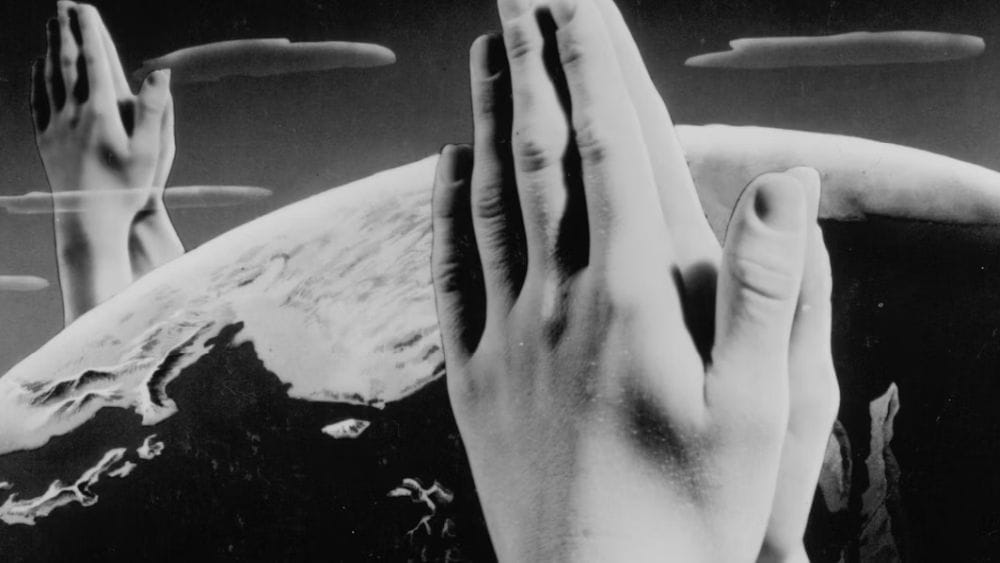
“Heaven is… uh… hmmm.” It’s honestly kind of amusing that Diane Keaton, in her first directorial credit, chose not only to make a documentary about heaven, but also that she chose to open it with somebody who doesn’t have an answer. In a documentary that is often as strange and as idiosyncratic as you might expect from such a prospect of "Diane Keaton makes a documentary about heaven" as she does here in Heaven from 1987, this opening gambit of sorts is a coy wink to the audience. Diane Keaton, the beloved actress who passed away at the age of 79, was known for her singular eccentricity and in mere moments gives her audience (which, at the time, was considerably modest) the comforting encouragement that this won’t be some Hollywood actor attempting for some deeply serious capital-m Message. Lee Grant (an Oscar-winning actor and later a very talented Oscar-winning documentarian) she was likely never to be.
Keaton’s film is an assemblage of people discussing death and what comes after it, usually lit like an ‘80s music video with deep shadows (sometimes in odd shapes like arrows or crosses, often just windows), spotlights and peculiar use of colour like magenta, fuchsia pink, orange, purple and blue. She occasionally utilises the swimming pool effect, where in some shots the lighting appears to be shimmering, reflecting off of the surface of a bath of water. There are slowly moving ombres effects and clouds. Like Powell and Pressburger’s A Matter of Life and Death, there are a lot of stairs. There are tables that extend out of other shapes like a surrealist painting. In Roger Ebert’s review, he called it “a sort of angelic limbo”, which I think is quite a nice turn of phrase. Many of the interview subjects appear in tight close-up or tucked away in the corner of the frame surrounded by negative space.
Keaton was clearly very into this style and the idea of “heaven”—that or it was just one big coincidence—because it is very similar in its visuals to the Belinda Carlisle music video for her number one Billboard hit “Heaven in a Place on Earth”. Keaton also directed that video this same year. I wish the version of Heaven most widely available on Tubi was as polished in its transfer as the version of that Carlisle video that’s readily available on YouTube. A second Keaton-directed video for Carlisle, “I Get Weak”, would see her further experiment with the MTV aesthetics of the era that she’d never be able to in her acting career.
Interspersed throughout are black and white film clips of how Heaven has been portrayed, commercials, and television panel discussions. Sometimes in rapid fire, other times with a more paced edit. Segments are introduced with title cards that look like something out of the 1920s. The sound mix is equally unexpected, as if inspired once more by MTV. Words spoken are sometimes looped and sampled, cut up and overlapped all while Howard Shore lends a swirling synthesised score. It's all a very odd soup of ideas and thought experiments. It’s easy to see why Heaven never really caught on as much more than a curiosity buried within the career of one of Hollywood’s most compelling and singular figures.
Directing would become something of a novelty of Keaton’s career, making rare narrative features like Unstrung Heroes and Hanging Up and a much-maligned episode of Twin Peaks’ second season alongside the aforementioned music videos. I wonder what she would have done if given the opportunity (if she wanted it at all) to make more. As seen with this stretch in 1987, her fondness for contemporary pop stylings could have been really well utilised in something bigger. Or at least utilised in further interesting ways. They could have also been a disaster. We’ll never know, obviously. Keaton’s passing gives a watch of this film even more of a lingering fascination. While she does not appear on screen or off asking questions, one can almost picture her in her famously tailored outfits just offside thinking to herself, ‘oh gee, well, gosh!’.
The movie probably isn’t all that profound as she maybe thought it was (there doesn’t appear to be too much coverage of the film and Keaton’s role as director of it), but in 2025 there’s a natural pathos to the material that belies its heavily stylised appearance. What did Keaton herself experience? Was it a magical place in the sky or was it right here on earth as she once filmed Belinda Carlisle singing about? I consider myself fairly agnostic about all this stuff—religion, I mean. If there is such a thing as a heaven, then I’d like to think it’s something of our own conjuring. Heaven, as a “concept” (as one of the talking heads describes it; a “great concept”) spoken about here sounds awfully uninteresting. Just a weird white plain full of heterosexual couples and so many harps, trumpets and clarinets.
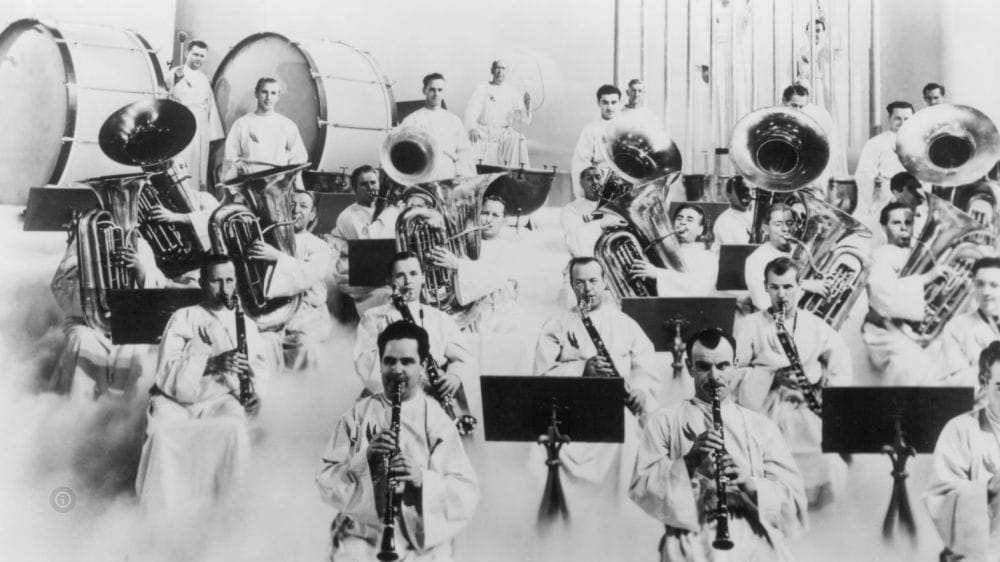
Intentional or not, she ends up highlighting the hypocrisy of much of this and how little anybody can ever really know. How much it shifts and changes whether you’re young or old, man or woman, rich or poor, conservative or punk (the two teenage girls who hypothesise that God is maybe a hottie in t-shirt and jeans like Bruce Springsteen or James Dean tickled me, truly). Hell, it changes whether you enjoy sex or you don’t! As she said in an interview with David Letterman at the time, “these answers were varied to say the least.” And maybe that’s what Keaton is trying to get at.
In that Letterman interview, she answers that she is “not sure” if there is a heaven, which I think is kind of interesting considering she made an entire film about it. I mean, look, it is all rather silly to consider when you see those movie clips. You mean to tell me that people go to heaven and then have to work in a band or as a greeter like they got a minimum wage job at K-Mart? You have to go and watch sermons all day in white clothes? What about all the buffets?!? And yet it persists. What happens after we die will remain the most unknowable of unknowns and so, really, it’s all just guesswork. She often spoke of her love for life, and her desire that she could impart that same zest onto her children. Maybe Heaven is just one big way of saying to stop thinking about all of this so much and just live your life while we have it. I turned 40 yesterday (two days after Keaton passed away at not even double that age) so I’m probably in a very unique spot with which to watch Heaven. I guess for me living life is knowing that some people choose to live their live watching movies like Heaven and writing about them for a little blog website like this. And ain’t that something?
If you would like to support documentary and non-fiction film criticism, please consider donating by clicking the above link. Any help allows me to continue to do this, supports independent writing that is free of Artificial Intelligence, and is done purely for the love of it.

